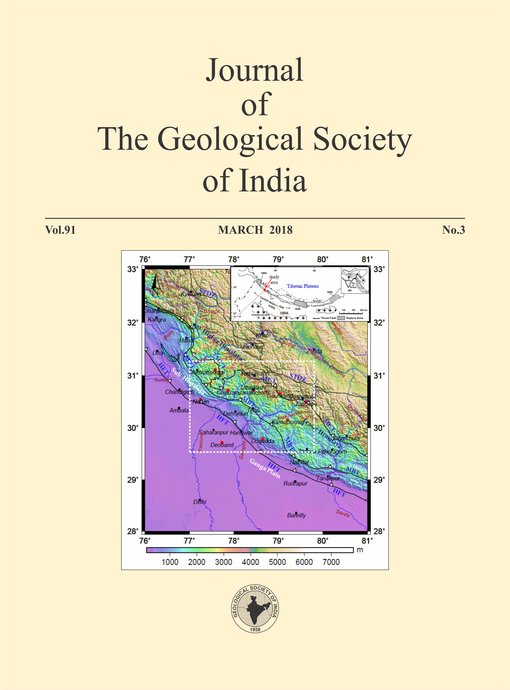Geotechnical Cartographic Synthesis of Bejaia City, North East of Algeria
DOI:
https://doi.org/10.1007/s12594-018-0861-6Abstract
Geotechnics has a significant contribution in the construction engineering and natural risks, by providing for many useful data to direct the regional planning and prevent catastrophes. The geotechnical cartography became imperative to satisfy the intensive requirement of data concerning the soil and the basement, which initiated the urban development, often anarchistic. Indeed the cartography in geotechnics is a very complex task, because information concerning the soil and the basement are diverse. Due to its coastal and touristic position, Bejaia is one of the promising cities of Algeria. The site, on which the city is erected, is as an amphitheater where the sea is the scene. Indeed, Bejaia is located on a site surrounded by mountains on the three sides, north-south -west and it faces the sea on the east, its extension requires the use of lands with broken topography, and lead to appearance of new urban zones. These were built without consulting the experts in the field of the civil engineering, particularly geotechnics. This article presents the geotechnical cartography of Bejaia city; which shows the preliminary results of the zone of study, based on existing geotechnical, geological and topographic data.Downloads
Metrics
Issue
Section
Downloads
Published
How to Cite
References
Cheick Sylla, A.K. and Chagnon, J.Y. (1995) Rapport technique final: La cartographie géotechnique de la ville de Conakry et de la Presqu'í®le de Kaloum/Guinée II. http://hdl.handle.net/10625/50437
Antoine, P. and Letourneur, J. (1973) Aperçu et réflexions sur les cartes géotechniques. Leur utilité pour l'aménagement de la montagne. Revue de Géographie Alpine, v.61(2), pp.231-245.
Aoudia, A., Vaccari, F., Suhadolc, P. and Meghraoui, M. (2000) Seismogenic potential and earthquake hazard assessment in the Tell Atlas of Algeria. Jour. Seismol., v.4(1), pp.79-98.
Arnould, M. (1974) Problèmes de cartographie en géologie de l'ingénieur (cartographie géotechnique). Annales de la Société géologique de Belgique, pp. 313–322.
Askri, H., Belmecheri, A., Benrabah, B., Boudjema, A., Boumendjel, K., Daoudi, M. and Ghomari, A. (1995) Geology of Algeria. In: Well Evaluation Conference Algeria, pp.1-93.
Carrasco, R. M., Pedraza, J., Martin-Duque, J. F., Mattera, M., Sanz, M. A. and Bodoque, J. M. (2003) Hazard zoning for landslides connected to torrential floods in the Jerte Valley (Spain) by using GIS techniques. Natural Hazards, v.30(3), pp.361-381.
Childs, C. (2004) Interpolating surfaces in ArcGIS spatial analyst. ArcUser, July-September, pp.32-35.
Chacón, J., Irigaray, C., Fernandez, T. and El Hamdouni, R. (2006) Engineering geology maps: landslides and geographical information systems. Bull. Engg. Geol. Environ., v.65(4), pp.341-411.
Machane, D. and Ourari, S. (2008) Identification, caractérisation et hiérarchisation des failles actives dans la Kabylie, étape 3: cartographie des failles actives dans la région de la Kabylie. Projet de recherche CGS/ DAS/2006/02.
Di Capua, G., Lanzo, G., Pessina, V., Peppoloni, S. and Scasserra, G. (2011) The recording stations of the Italian strong motion network: Geological information and site classification. Bull. Earthquake Engg., v9(6), pp.1779-1796.
Fares, A., Rollet, M. and Broquet, P. (1994) Méthodologie de la cartographie des risques naturels liés aux mouvements de terrain. Revue française de géotechnique, v.69, pp.63-72.
Harbi, A., Maouche, S. and Ayadi, A. (1999) Neotectonics and associate seismicity in the Eastern Tellian Atlas of Algeria. Jour. Seismol., v.3(1), pp.95-104.
Ramakrishnan, D., Singh, T.N., Verma, A.K., Gulati, A. and Tiwari, K. C. (2013) Soft computing and GIS for landslide susceptibility assessment in Tawaghat area, Kumaon Himalaya, India. Natural Hazards, pp.1-16.
Aourari, S. (2008) Apport de la télédétection dans la cartographie des l'aléa sismique. Workshop « L'Outil Spatial au Service de la Gestion des Catastrophes et des Situations d'Urgences en Afrique », 10 au 12 novembre 2008, organisée par CRASTELE-LF/ UN/OOSA.
Sharma, L. K., Umrao, R. K., Singh, R., Ahmad, M. and Singh, T. N. (2017) Stability investigation of hill cut soil slopes along National highway 222 at Malshej Ghat, Maharashtra. Jour. Geol. Soc. India, v.89(2), pp.165174.
Singh, T.N., Singh, R., Singh, B., Sharma, L.K., Singh, R. and Ansari, M.K. (2016) Investigations and stability analyses of Malin village landslide of Pune district, Maharashtra, India. Natural Hazards, v.81(3), pp.2019-2030.
Sharma, L.K., Umrao, R.K., Singh, R., Ahmad, M. and Singh, T.N. (2016) Geotechnical characterization of road cut hill slope forming unconsolidated geo-materials: a case study. Geotech. Geol. Engg., v.1(35), pp.503-515.
Younes, H. (2011) Cartographie géotechnique, des risques de glissements (CRG) et de risques d'inondations (CRI) de la ville de Bejaia. Thèse de Magister, Université de Bejaia, Algérie.
Yarbasi, N. and Kalkan, E. (2009) Geotechnical mapping for alluvial fan deposits controlled by active faults: a case study in the Erzurum, NE Turkey. Environ. Geol., v.58(4), pp. 701–714.
Youssef, A.M., Pradhan, B. and Tarabees, E. (2011) Integrated evaluation of urban development suitability based on remote sensing and GIS techniques: contribution from the analytic hierarchy process. Arabian Jour. Geosci., v.4(3), pp.463-473.
Tadios, S. (2013) GIS-based Geotechnical Microzonation Mapping using Analytic Hierarchy Process: a case study in Shire-Endasilasie City, Tigray, Northern Ethiopia. Momona Ethiopian Jour. Sci., v.5(2), pp.101-116.

 S. Lillouch
S. Lillouch






